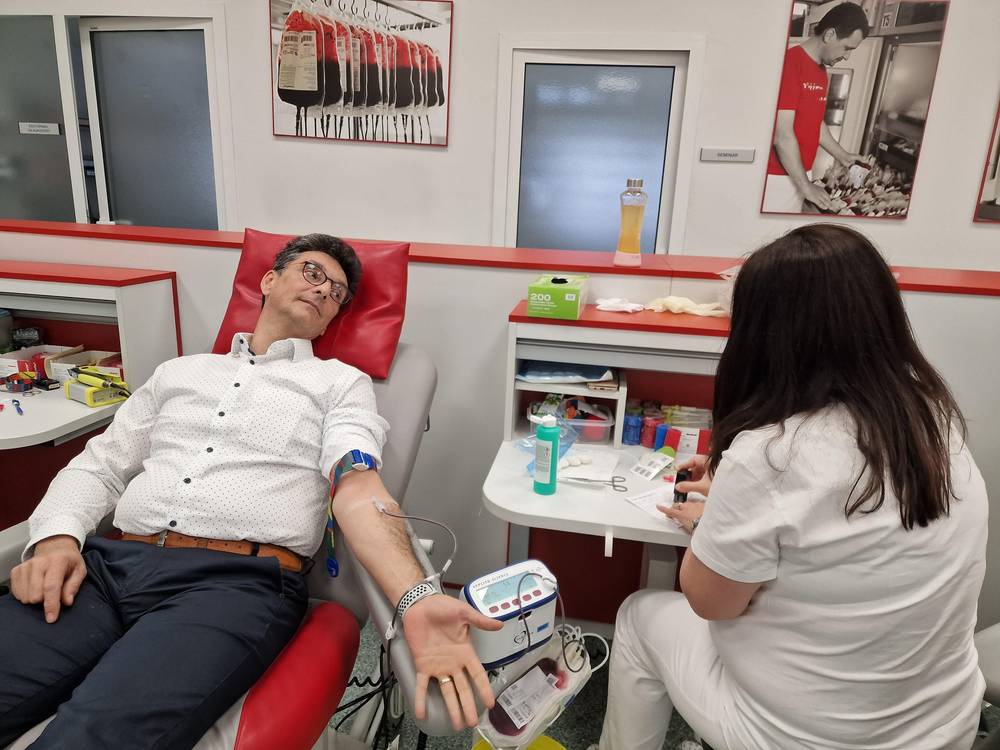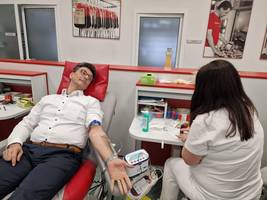Despite the progress of science and medicine, blood remains an irreplaceable medicine, which is why blood donors represent an important part of the health care system of each country. Approximately 5 percent of the population in Slovenia donates blood. In order to satisfy the needs of the healthcare system for blood, 300 to 350 blood donors would have to donate blood every work day.
The Human Rights Ombudsman, Peter Svetina, also decided to donate blood with some of his co-workers and joined approximately 100,000 blood donors who donate between 42,000 and 45,000 litres of blood every year. Namely, Slovenia is among those countries which cover all of the needs of their health systems due to a sufficient number of blood donors, while in most countries finding volunteers and ensuring safe blood still represents a challenge.
During the blood donation, the Ombudsman emphasised: “We never know when our actions can help someone get better or have a better quality of life. A small gesture of solidarity can strengthen the interconnection of society, which is indispensable if we want to progress.”
The World Blood Donor Day falls on 14 June. It is on that very date in 1868 that Austrian biologist and pathologist Karl Landsteiner was born. He discovered blood types A, B, and O, which led to the wide use of blood transfusion and brought about a substantial progress in the field of medicine. For this, he was also awarded the Nobel Prize. Blood Donor Day in Slovenia is commemorated on 4 June when we recall the first 19 bottles of blood that were extracted and preserved in 1945.
Donating blood in Slovenia has been based on the principles of voluntary and unpaid blood donation since 1953, which is the basic condition to ensure safe blood supply.
“This places us among well-organised and selfless nations, which is something to be proud of,” Ombudsman Svetina highlighted.
This year, the organised, voluntary, free, and anonymous blood donation under the auspices of the Red Cross marks the 70th anniversary, which is why the Ombudsman sincerely thanks everyone who selflessly donates blood and expresses respect for their work to all who make sure that the blood safely reaches those who need it.
Donating blood is a noble virtue which, for the most part, is handed down through generations just as it is between those who are like-minded in societies, occupational groups, among peers, students, and co-workers. The Ombudsman's colleagues also decided to contribute together by donating their blood, thus spreading the values of solidarity both between colleagues and as an example to other public servants. “With the blood they donated, the donors have already changed many sad stories into happy ones, and I believe that our gift will also contribute to that,” added Ombudsman Svetina.


![[Translate to English:] Varuh s sodelavkami in sodelavci po darovanju krvi [Translate to English:] Varuh s sodelavkami in sodelavci po darovanju krvi](/fileadmin/_processed_/3/c/csm_Skupinska_60a9abd68a.jpg)